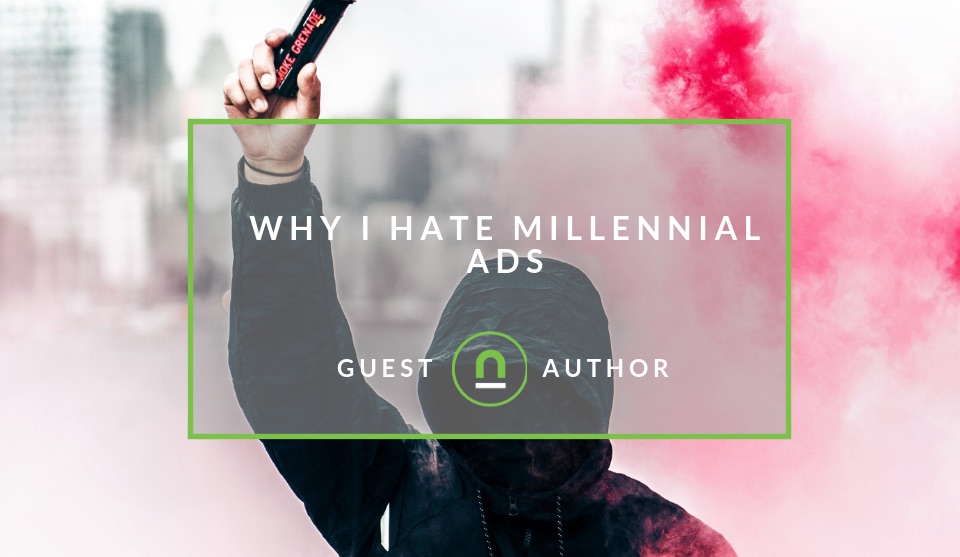Recent posts

Shopaholics
How to Choose A Perfect 2-Seater Couch for Small Spaces
28 February 2025

Money Talks
How Crypto Technology Continues To Revolutionise The Business World
27 February 2025

nichemarket Advice
How to Choose the Best Copy Trading Platforms for Maximum Return
24 February 2025

Mind, Body & Soul
A Guide to Cannabis Seeds in South Africa
21 February 2025
Popular posts
Extravaganza
Trending Music Hashtags To Get Your Posts Noticed
24 August 2018
Geek Chic
How To Fix iPhone/iPad Only Charging In Certain Positions
05 July 2020
Extravaganza
Trending Wedding Hashtags To Get Your Posts Noticed
18 September 2018
Money Talks
How To Find Coupons & Vouchers Online In South Africa
28 March 2019
Why I Hate Millennial Ads
08 April 2019 | 0 comments | Posted by Sizakele Nene in Industry Experts
Sizakele Nene is a copywriter and community manager at Arc Interactive. In today's post, she takes us through why millennial ads are missing the point and failing to resonate with consumers.
Millennials represent the largest group of consumers worldwide. So, it only makes sense that they’re the most studied and mapped out audience in advertising today. However, it seems that advertising’s obsession with this group has had the adverse effect, judging by the significant backlash specific ads have had recently and the growing occurrences of other brands calling out their counterparts on creating “generic millennial ads” that fail to serve any real purpose.
Also, more than 80% of millennials have declared that they hate ads, lots of us have ad blockers and have become impervious to brands continually trying to sell us something.
Advertising on a personalisation quest
Advertising has been on a great search for personalisation since the discovery of the Unique Selling Proposition (USP) during the “Golden Age” in the early 1900s. Although still relevant, the USP now lies less in the product’s composition, since the focus is now the consumer. This means that the traditional hard sell isn’t what’s going to get you that sale; instead, it’s how well you know your customer and the kind of content that adds value to their lives. For the most part, brands have done their research and nailed the facts, figures and behaviours associated with millennial audiences, but it’s the execution part that’s been a bit tricky — viewers have accused brands of being dogmatic, predictable and even offensive in their approach to issues of diversity, social responsibility and the environment.
One recent ad that does a great job of reviving ancient stereotypes and evoking anger and ridicule from millennial audiences depicts people of colour being paraded mindlessly under the guise of being “proudly South African”. The issue here isn’t being proudly South African, but rather this particular brand’s understanding and portrayal of it. If anything, it makes the audience question the brand’s integrity and whether minority and previously disadvantaged groups are a part of the decision-making process within that company. Cultural biases, stereotypes and misrepresentation of entire groups of people are not humorous and it’s no longer acceptable for brands to think they can get away with this type of advertising.
How to create relatable ads?
How can brands develop ads that audiences can relate to, then?
Well, I’d say the best way to show that you understand an audience is to hone in on the individual experience. Giving a microscopic view of an individual’s triumphs, struggles, successes, failures and even quirks makes for a more relatable advert. Which makes sense, if you think about it, since it is individuals that make up the group and also thought they might consider their experiences separate and different, there’s
For example, Nike’s Dream series, featuring prominent sportsmen and women who have turned the word ‘crazy' on its head with their very existence. The success of these and other ads that have taken the notion of trailblazing and the breaking of the proverbial glass ceiling, which is so often associated with the millennial demographic, lies, in part, in the fact that they zone in on the individual.
Our yearning for individual stories may be a product of sheer self-importance or the unarticulated loneliness that comes as a byproduct of having to form and maintain most of our relationships through the glass screens of our phones. Nevertheless, consumers aren’t happy with one size fits all narrations of groups — these only come across as unimpressive caricatures since no two people feel that they share the same kinks and mannerisms. If anything, generalisations come off as patronising and archaic, no matter how well intended.
The impressive repertoire of research advertisers have put together has described the millennial demographic as restless, impatient, revolutionary, social, creative, empowered etc. and these aren’t untrue. If anything, we’re okay with being revolutionary and, for the most part, we
So, all that research, budget and big ideas are going to be a bit of a waste, until more brands wake up to the fact that being “revolutionary” — caring about the environment and seeking healthier, more sustainable methods and practices — aren’t just fun things we do, they’re ways to survive and solve problems we didn’t create.
Ads need to talk to us, not for us
Until advertising looks at the very minor details and aims to bring real value, create and join real conversations without being patronising or depicting “us” as this ridiculous monolith; it will continue to be the stuff of angry Twitter rants and office jokes.
Can brands successfully create this authentic material without actually having one of every kind of “us” sitting at their decision making tables? Well, I’ll leave that for you to decide.
About the author
Sizakele Nene is an avid reader of historical novels and African literature. When she hasn’t got her nose stuck in a book, she’s fulfilling her role as a Copywriter and Community Manager at Arc Interactive.
Tell us your story
Would you like to write for nichemarket just like Sizakele has? Find out how to submit a guest post and when you're ready, you can contact us.
Are you looking to promote your business?
South African business owners can create your free business listing on nichemarket. The more information you provide about your business, the easier it will be for your customers to find you online.
Registering with nichemarket is easy; all you will need to do is head over to our sign up form and follow the instructions. If you require a more detailed guide on how to create your profile or your listing, then we highly recommend you check out the following articles.
Recommended reading
If you enjoyed this post and have time to spare why not check out these related posts and dive deeper down the rabbit hole that is advertising.
Tags: advertising
You might also like
How to Choose A Perfect 2-Seater Couch for Small Spaces
28 February 2025
Posted by Candice Reed in Shopaholics
Are you struggling with choosing a perfect 2-seater couch for your small space? Learn how you can find the one that perfectly aligns with your choice...
Read moreHow Crypto Technology Continues To Revolutionise The Business World
27 February 2025
Posted by Katrine Vidstid in Money Talks
Learn how cryptocurrencies impact more than just investing. Discover their revolutionary potential in business, from secure transactions to innovativ...
Read more{{comment.sUserName}}
{{comment.iDayLastEdit}} day ago
{{comment.iDayLastEdit}} days ago
 {{blogcategory.sCategoryName}}
{{blogcategory.sCategoryName}}
